


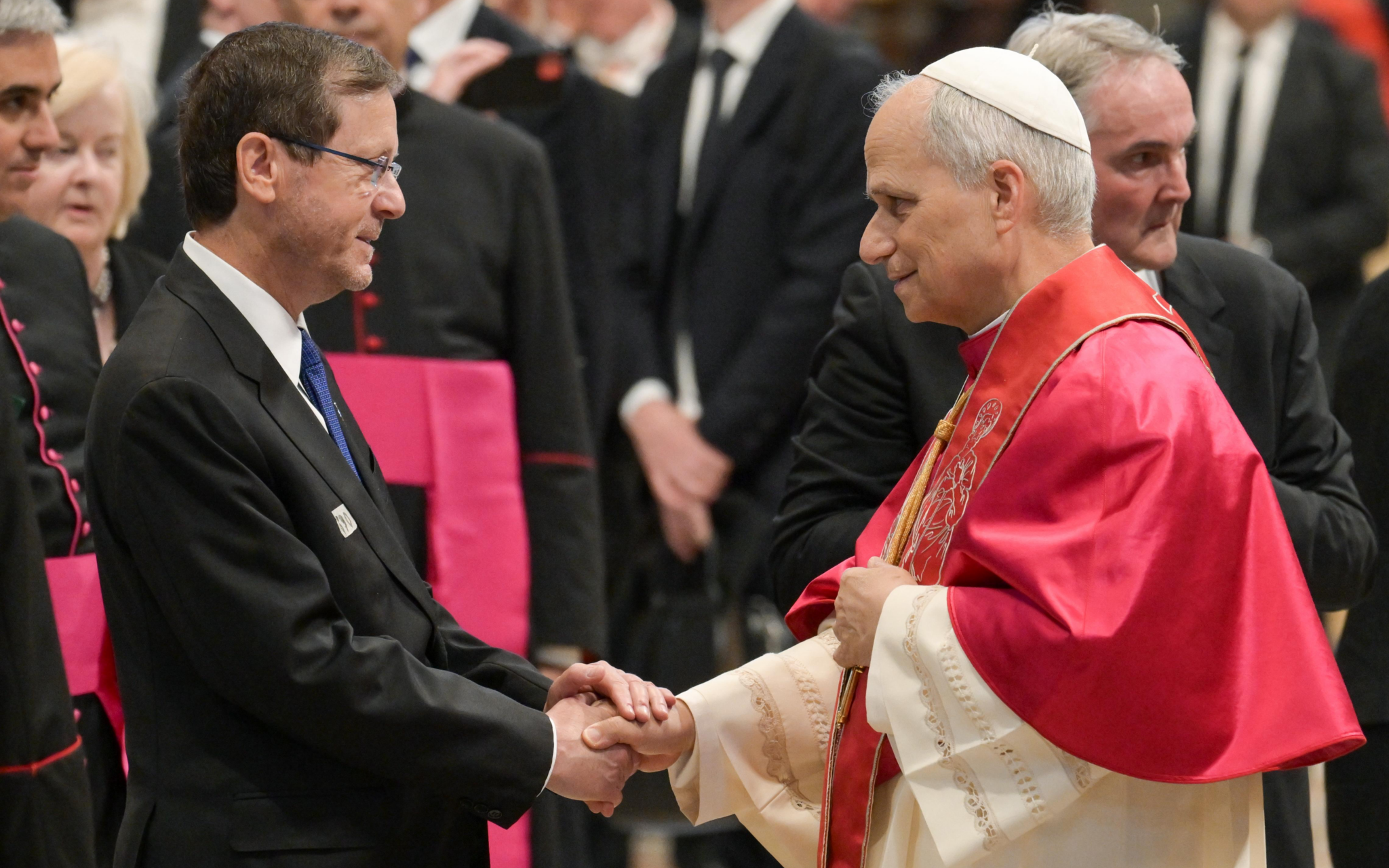
President Isaac Herzog and a delegation of rabbis and Jewish lay leaders were among the hundreds of heads of state and government and religious representatives who attended Pope Leo XIV at St. Peter Square in Rome on Sunday, expressing hope for a resent in relations amid tensions with the Vatican over the Gaza war.
Herzog had the opportunity to briefly speak with the pope at the end of the event, while the Jewish leaders will take part in a meeting between non-Christian religious delegations and the new pontiff at a special audience on Monday.
After the Hamas onslaught of October 7, 2023, Pope Francis’s relationship with Israel and many Jewish leaders became increasingly tense, as he became more critical of Israel’s response, hosted overt displays of Palestinian nationalism in the Vatican, and on one occasion suggested that Israeli actions should be investigated as potentially constituting genocide.
Angry over his stance, Israel largely boycotted Francis’s funeral with only Israel’s ambassador to the Holy See attending and no government ministers.
Showing continuity with his predecessor Francis, the first American pope, born Robert Francis Prevost, has been putting peace at the forefront of his message since his election on May 8.
Toward the end of his homily, the pope explicitly mentioned that war zones should not be forgotten even in a joyous time.
“In the joy of faith and communion, we cannot forget our brothers and sisters who are suffering because of war,” Leo said. “In Gaza, the surviving children, families and elderly are reduced to starvation. In Myanmar, new hostilities have cut short innocent young lives. Finally, war-torn Ukraine awaits negotiations for a just and lasting peace.”
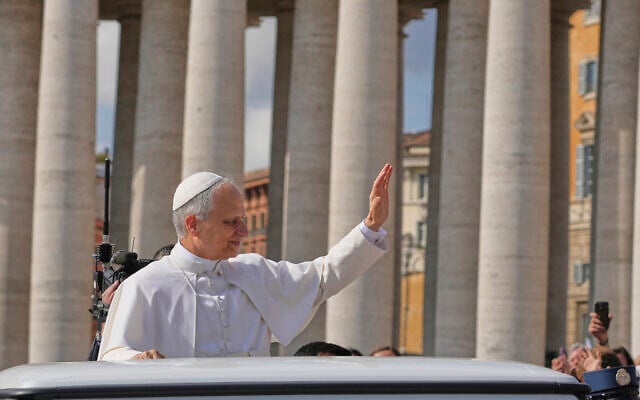
Leo did not mention the hostages.
Still, Jewish leaders who spoke with The Times of Israel expressed their hope that Leo’s papacy could mark a new page in Jewish-Christian relationships.
Rabbi Noam Marans, director of interreligious affairs at the American Jewish Committee, was among the first Jewish leaders to receive a personal note from the pope, where Leo expressed his commitment “to continue and strengthen the Church’s dialogue and cooperation with the Jewish people.”
Marans said these messages created “a more positive narrative in the immediate short run.”
“Everyone understood that the relationship needed new oxygen because it was in some state of crisis,” Marans told The Times of Israel. “I am taking an approach of guarded optimism, and I think that we need to acknowledge that he and his advisors are giving this matter attention, at least based on what has happened so far.”
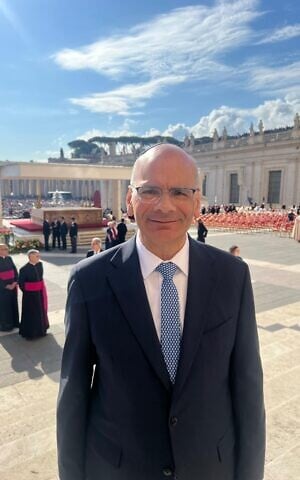
Asked about Sunday’s Gaza remarks, Marans highlighted how, in his first mass on May 11, Leo called not only for a ceasefire in the Strip but also for the release of the hostages and said that, no matter what, the pontiff is going to look at the world through the lenses of a Catholic leader.
“Popes are going to bring up the major crises, especially when there are significant numbers of noncombatant innocents [who are affected],” the rabbi said. “This is not going to change with Leo’s papacy. There may be some more nuance and diplomatic language, but we do not expect this part of the Church’s narrative to change.”
“We are also concerned about noncombatant innocents in Gaza, but how their plight can be mitigated immediately is with the release of the hostages, and that is in the hands of the diabolical Hamas,” he added.
There are currently 58 hostages still in Gaza, 23 of whom are believed by Israel to be alive.
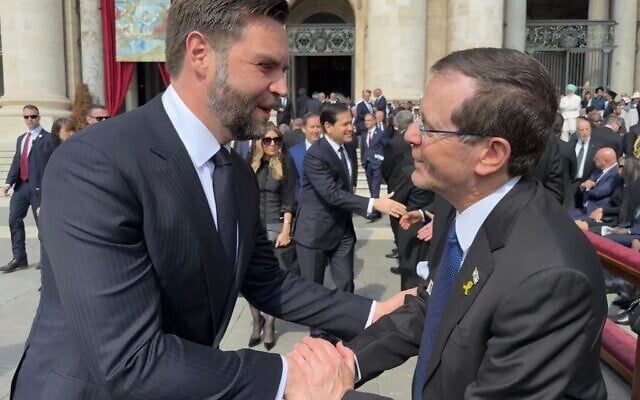
Shaking hands with the pope at the end of the inauguration ceremony, Herzog also expressed his gratitude to the new pontiff for calling for the return of the hostages.
The president, who sported a yellow ribbon pin and a piece of tape marking the 590 days that Israeli hostages have been held by Hamas in Gaza, “used the occasion to urge the pope to continue working for their release and to promote the renewal of interfaith dialogue,” according to a statement released by his spokesperson.
Herzog also invited the pope to visit Israel.
World leaders attending the inauguration in Rome included US Vice President JD Vance, one of the last foreign officials to see Pope Francis before he died, US Secretary of State Marco Rubio, Ukrainian President Volodymyr Zelensky, German Chancellor Friedrich Merz, European Commission President Ursula von der Leyen, Spain’s King Felipe VI, Dutch President Dick Schoof, and Italian Prime Minister Giorgia Meloni and President Sergio Mattarella.
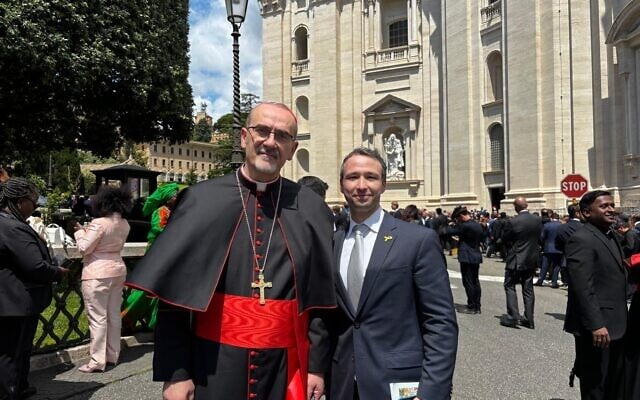
According to his spokesperson, Herzog spoke with several of them.
Three dozen of the world’s other Christian churches sent their own delegations, the Jewish community had a 13-member delegation, half of them rabbis. Other representatives headed Buddhist, Muslim, Zoroastrian, Hindu, Sikh, and Jain delegations.
On Sunday morning, Leo, who also holds Peruvian citizenship, privately met with Peruvian President Dina Boluarte, while in the afternoon, he received Zelensky.
In a post on X, Zelenskyy said that he stressed the need for a “full and unconditional ceasefire as soon as possible” and for diplomatic pressure on Russia “until they are eager to stop the war.”
No other private meeting was included in the pope’s public schedule for Sunday.
Therefore, the meeting with religious leaders will mark one of the first since the official beginning of Leo’s papacy.
“The Jewish delegation was treated with tremendous respect, seated just next to the world leaders,” David Michaels, director of UN and Intercommunal Affairs at B’nai B’rith International, told The Times of Israel.
Michaels said that the Pope’s inauguration, while historic for the Catholic Church, is also of “tremendous significance” for the Jewish Community.
“Despite all of the challenges, tremendous progress has been made over the past 60 years since the Second Vatican Council and the document Nostra Aetate,” he said. “We are deeply committed to making sure that the progress continues.”
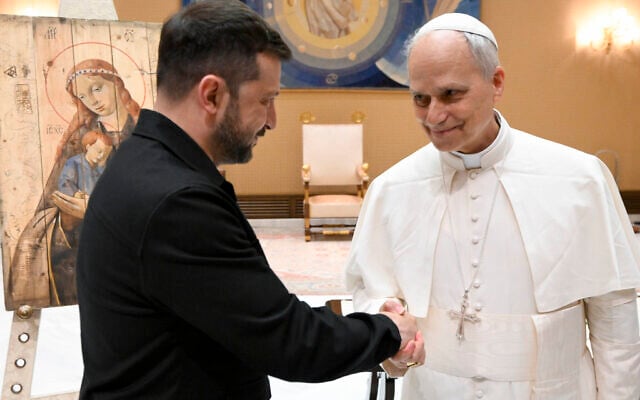
Nostra Aetate was a landmark document in the 1962-1965 Council that repudiated the concept of collective Jewish guilt for the death of Jesus and urged dialogue with non-Christian religions.
The brief document revolutionized Catholic relations with Jews after centuries of persecution and mistrust.
“Today, of course, we were there simply to take part in the pope’s inauguration, but tomorrow, and in subsequent meetings, we will have a much better idea of his philosophy, plans and intentions,” Michaels said.
“We know that the church, institutionally, is deeply committed to the relationship, to the friendship, and that he personally has expressed his commitment to the relationship,” he added.
